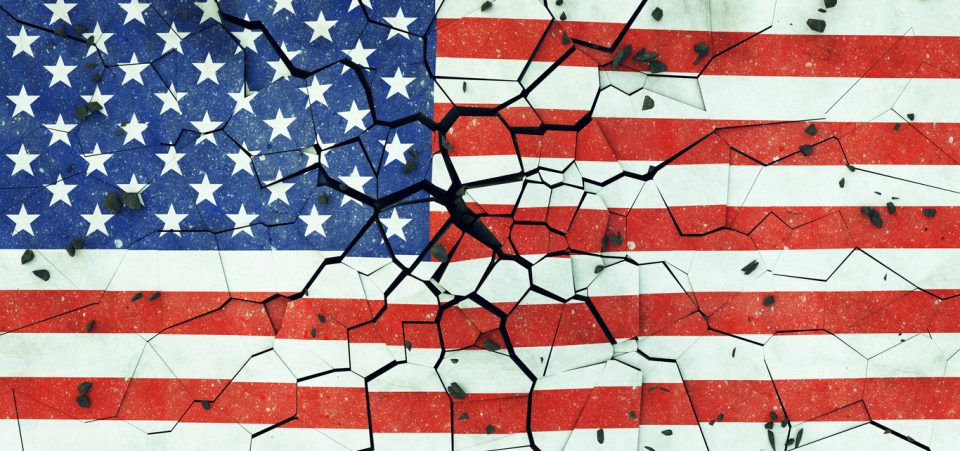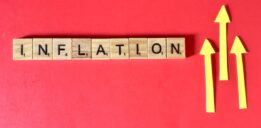Economic Collapse Might Be a Mere Footnote in the Next American Conflict
The American mainstream media seems disappointed that the two nuclear weapon-equipped superpowers have decided not to blow themselves to pieces. Short of that, perhaps those same journalists who went in total meltdown mode in Helsinki can revel in the imminent U.S. economic collapse.
It seems nothing short of full thermonuclear war will do for the CNN/CNBC/Fox ‘pundit’ class.
Judging by the mainstream media’s shrieking comments about the Trump-Putin summit in Helsinki, Finland, President Donald Trump was treasonous.
Yet, what’s at stake is at once less and more dangerous than atomic obliteration.
It’s less dangerous because the conflict that’s brewing is destructive to all parties, conventional in weaponry and approach, and is affecting the United States in particular.
It’s more dangerous because, given its domestic confines and non-nuclear nature, it has a higher chance of erupting.
Economic Collapse From Civil War
This conflict might best be described as another American Civil War.
It doesn’t need sophisticated weapons. As the U.S. economic collapse gathers momentum, the new civil war will aggravate situations that have already started.
Social breakdown is already happening, but the financial markets have masked the ever-growing risk of economic collapse.
Trump did not set the U.S. economy on its current destructive path. Yet, indirectly, the president has hastened the process of economic collapse.
The financial crisis of 2008 was merely the first round. Its roots go back to the deregulation of 1998 and the propagation of financial models that have failed.
Indeed, for all the criticism—some of it valid, much of it having crossed the boundaries of hysteria—Democrats and Republicans have hurled against Trump, a crucial point is missed.
Trump is a symptom. He is not the cause of their malaise. And although “Russiagate”—the alleged collusion between the Trump campaign and the Russian government—continues to pester Americans like some “Energizer” bunny, it was always just a distraction.
“Yes, We Can” But “No, We Won’t”
Trump’s election was the inevitable result of both the policies that led to the 2008 economic collapse and the Democrats’ failure to lead the country (and, in a sense, the West) in a better direction.
Barack Obama campaigned on a recipe of “change” and “hope.”
In fairness, after bailing out the banks, which held most of the responsibility for the Great Recession, the George W. Bush administration left Obama little choice.
The president’s own party colluded, not with the Russians, but with its rivals in Congress. The Democrats did not even utter a peep against the mighty investment banks on Wall Street to stand up for the little guy.
Surprisingly to some, Trump understood this and chided the Wall Street establishment (how sincerely remains a matter for debate).
The Democrats, meanwhile, took it for granted that Wall Street, the foundation of global finance, wiped out Main Street’s savings. They allowed finance to completely take over the real economy.
Now, the Democrats would do better to look for the culprits responsible for Trump’s win and Hillary Clinton’s defeat in downtown New York rather than the Kremlin in Moscow.
The Democrats, even more than the Republicans (and certainly more than Trump, even in episodes of his hit show The Apprentice) persuaded the working classes—including the unemployed white middle-aged men that many have identified, superficially, as his base—to live according to the market and its rules.
Rather than take a risk, the Democrats failed to propose solutions to confront even the mere side effects of economic collapse.
The Identity Politics Trap
Instead, the Democrats channeled grievances, touching the off-key heartstrings of identity politics.
The Republicans were, as ever, more practical. They also played a form of identity politics, only more cynically.
They blamed immigrants.
Of course, this too failed to deliver answers, much less solutions, to the anger and discontent. But it did manage to consolidate popular opinion against a common culprit, which everyone could rally against, especially as far as many Trump voters were concerned.
Moreover, while the Democrats buried the economic collapse under an identity carpet, the Trump Republicans at least acknowledged that many once-content Americans were feeling insecure economically.
In so doing, the Democrats threw their base under the bus, splitting it in the process.
The Republicans reaped what they sowed. They attracted many votes that would normally have gone to their Congressional rivals.
They didn’t have to move a finger because nobody dared address the proverbial white elephant in the room (or the voting booth).
Nobody from any party (except perhaps Bernie Sanders) dared mention the unthinkable: How to better distribute wealth—or how to resolve glaring income inequality.
Has Anything Changed?
The problem of wealth imbalance remains. And so do the risks in the market that can trigger economic collapse.
Still, the problem has become worse. It’s no longer economic in nature. The divisions in American society are deeply social and political.
The voting booth won’t contain the resulting clash between Liberals and Conservatives.
An ever less distinguishable Washington/Hollywood establishment continues to drive the Robert Mueller investigation and Russiagate.
It’s simply much easier and more effective than taking on the world of big finance.
Irrespective of the 2016 election results, the winner would have had to confront the same toxic economic cocktail.
But nobody has, and it’s getting bigger and worse. How much longer can Russiagate continue, beyond substance-free indictments?
What Was Certain Is No Longer So
The erosion of such certainties as an American middle class or the very notion of democracy has accelerated. Economic collapse, in a grander scheme, is both a contributor and an effect of the same avalanche.
The insistence on attributing Trump’s victory to Russian interference reflects a stagnation of ideas.
The media, despite countless viable explanations, articles, and books—like Mark Lilla’s, The Once and Future Liberal—have presented the most viable explanation for Trump’s win and for the demise of liberalism.
Now, after less than two years in office, Trump has shattered the old certainties. He’s substituted these with a pervasive instability in all sectors, whether economic, financial, monetary, political, social, military, or diplomatic.
Trump’s First Act Is Closing, What Follows?
The world has seen Trump’s first act. We still do not know what will come next. But it’s the Senators and Congress members who must be watched.
They have made it clear that action will be forthcoming against the president for having behaved in a manner some described as treasonous. Anderson Cooper was very sad. (Source: “Former intel chiefs condemn Trump’s news conference with Putin,” CNN, July 17, 2018.)
Nobody should be surprised if the word “impeachment” starts to get more resonance in certain circles.
What would those pundits and former alphabet agency officials with more skeletons in their closets than in the catacombs have said about President Richard Nixon visiting China, President Ronald Reagan meeting Mikhail Gorbachev, or President Franklin Delano Roosevelt discussing strategies to end WW2 with Joseph Stalin?
Meanwhile, as investors continue propping up stocks, oblivious to the many risks and contradictions that thrive in the United States—even more so than from beyond—celebrities decide to raise the bar of their intellect up a notch.
Arnold Schwarzenegger even made a video about it, capturing the essence of how Hollywood feels about the leaders of the two nuclear superpowers deciding to defuse bilateral ties.
Who Really Wants Peace in the U.S.?
Certainly not those occupying cushy seats in the Capitol or in the world of Hollywood.
They are fueling tensions between the United States and the world (Trump has done well in that department too).
Yet, they are also fueling tensions between Americans themselves, splitting the country into two camps and feeding a conflict that could spill from the halls of punditry to the streets.
A Preference for International Tension and an Ignorance of the Domestic Kind
The superstars seem to prefer “humanitarian bombings” to dialogue and confrontation.
As far as U.S. foreign policy is concerned, I have written numerous articles for Lombardi Letter in which I have criticized many aspects of the Trump administration. Especially his strategy with regard to the Middle East and Iran.
But even there, the Democrats promised worse and more conflict, perhaps to distract from the glaring domestic problems.
Nevertheless, Trump has shown a willingness to adopt pragmatic approaches.
As for the “Liberals”—a rather liberal way to describe them, given they’re rather void of any liberal characteristics—they complain that the U.S. cannot disengage from Syria.
Susan Rice, a former Obama national security advisor, urges the U.S. administration not to leave Syria in the hands of Bashar al-Assad.
Trump realized—and made it clear during the campaign—that the U.S. establishment of all political colors has been responsible for several disasters over the past 25 years (from the war in Yugoslavia and Kosovo to the Middle East).
The Democrats and some of their Republican colleagues, however, still have the courage to pontificate.
Trump’s effort to improve relations with Russia will activate a dangerous backlash. And the war this time may not involve foreign missions, but domestic ones.
Economic collapse will be a mere symptom of a bigger catastrophe.






